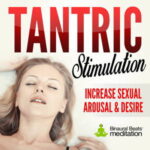Meditation improves psychological balance by enhancing overall health and well-being.
It reduces stress and anxiety and helps you cope with difficult emotions and the challenges of everyday life. (1).
Any amount of meditation is beneficial, but with such busy lives it can be difficult for us to fit it in.
The benefits of meditation come through regular practice and will be in proportion with your consistency.
So it's important that you find a time you can commit to each day – even if it's not the same time every day.
So let's help you do just that.

When is the Best Time to Meditate?
1. Morning Meditation
Many meditators choose to meditate early in the morning when the day is new, the mind is afresh and distractions are fewer.
Meditating the morning sets you up for the day.
It's a ritual that connects you with your mind and body and centers your attention in the present moment. It sets a good intention for a calm, focused, stress-free approach to the day.
I like the idea of meditating in the morning because you are essentially flipping the stereotype of the “mad morning rush” that leaves us all feeling a bit stressed on its head and taking a completely different approach to the start of the day.
Another good reason to meditate in the morning is to do so before you eat.
Digestion makes the mind and body internally active due to a number of hormonal processes that occur when we eat.
If you want to meditate after you eat then it's best to allow a gap of 30 – 45 minutes for digestion.
What you can do is wake up and have a light breakfast, and then go and shower and get ready. By the time you have got ready, your food would have been adequately digested and you can do 15 or 30 minutes meditation before leaving the house.
2. Mid-Morning Meditation
A mid-morning meditation can also be a practical time for many people.
If you're too busy rushing around in the morning getting the kids and yourself ready for work, you might find that mid-morning works better for you.
Some people really like to crack on and get the day started, knowing that the morning is the when they are most productive, and stopping to meditate may feel like disrupting that routine.
Mid-morning meditation will come a time when you have already had a number of hours to get your teeth into your work and complete a large number of tasks.
This also comes well before lunch, so you won't even a heavy meal yet.
Most people take a drink breaking it morning anyway, so why not make a hot drink and meditate for 15 to 20 minutes before going back to work and doing another couple of hours before lunch.
3. Lunch Time Meditation
You can split your lunch hour between eating and a meditation session; though you may not feel like siting down to meditate straight after you have eaten.
It may be better to meditate before you eat, though you might be really hungry, which will distract you when trying to meditate.
If you can eat your lunch within the first 15 minutes, and then give yourself 30 minutes to digest, you'll still have 15 minutes left for a meditation session.
Having a light, plant-based lunch may make all the difference to your digestion. In this case you might get away with leaving just 15 minutes for digestion and then having time for 30 minutes meditation.
Meditating in the workplace can be difficult due to distraction, though more modern offices have a meditation/prayer room – so take advantage if you have access to one of those.
If not, you might choose to use meditation music to block out any distraction, and find the quietest space you can.
Remember that even sitting outside for a while, or taking a slow walk is meditative and beneficial, so do what you can within the environment you work.
If you work from home, leave the room you work in and meditate in another room, as it's important to draw a line between your work space and your relaxation space.
4. Mid Afternoon Meditation
Mid-afternoon meditation can work but can also be problematic for some people.
Many of us feel a dip of tiredness in the mid-afternoon, having been up early and probably not getting the amount of sleep that we should.
Moreover, if you've had a fairly heavy lunch then you may also experience this mid-afternoon slump.
It's an entirely different subject matter but diet plays a big part in this, and if possible you should limit your intake of stimulants such as caffeine and sugary snacks to avoid big highs and lows through the day.
The last thing you want to do is take a 15-minute break to meditate at work and then end up falling asleep. That may make you feel groggier rather than revitalized.
However, if you're not someone that is likely to fall asleep, then taking a break to meditate mid-afternoon can actually refresh your brain and give you some much needed reprise from tapping away at the computer or whatever work you are doing.
5. After Work / Early Evening Meditation
Meditating at the end of the workday is the perfect way to create a natural boundary between work and your personal life.
It's a great way to stop thoughts of work spilling over into the evening, which leaves you feeling like you never detach completely from the office.
Meditation of the work helps you de-stress. It symbolizes the start “me” time and will help you relax.
In the spring and summer months meditating in the early evening will allow for you to go outside. This really enhances meditation, particularly if you are doing so as the sun is going down.
Being outside among nature, either in your garden or in the park, brings an extra dimension to the meditation where you are connecting with Mother Nature and the world at large.
6. Meditating Before Bed
There is no right and wrong when it comes to meditation. Everyone should find a practice that's right for them and fits around their lifestyle.
However, the goal of meditation is not to fall asleep, so doing so before bed probably is impractical for most people.
Consider that meditation is to fall awake into the world, to open your mind to higher consciousness and relieve it of the grasping and striving of everyday life. in essence it is a training of the mind, and quite different to falling asleep.
that being said, those who have trouble falling asleep may find it beneficial to do a meditation session before bed.
The reason for this is that meditation has a very calming effect on the mind and body. It brings your mind home and will calm an overactive mind that is jumping sporadically from thought trail to thought trail.
If you are someone who is dead on their feet by the end of the day and is likely to fall asleep, there is little point doing your meditation session before bed.
In this case it is good to maintain a solid mental distinction between meditation and sleep.
7. Meditating When You Need To
If you have the luxury of flexibility within your day, being able to meditate whenever you feel overwhelmed, anxious, or stressed is ideal.
In meditation, we free the mind and, in essence we should be free to be able to do this when we need to – rather than being constrained by planning and routine.
So instead on jumping on social media for a quick fix, or making another coffee, turning to meditation is a much healthier option for the mind.
The problem is that we are usually pressured by time, anxious, and distracted. Meditation is more likely to be something we do when we already feel calm, rather than something we turn to when the mind is in turmoil.
What to Do When You Can't Stop Thinking or Sit Still
Contrary to popular belief, the goal of meditation isn't to stop thinking, but rather to let go of thoughts as they arise and detach our awareness from them.
By doing this you see thoughts and feelings attached to those thoughts for what they are, and as such you are able to become fully present in the only thing that is real – and that is this moment happening now.
However, what tends to happen is the moment you sit down to meditate your thoughts begin to ramp up and you find yourself following these thoughts down many valleys and rabbit holes, so to speak.
Indeed, most of us are fully aware of the benefits of meditating, but sitting cross-legged like a Buddhist monk for 30 minutes or an hour isn't appealing to everyone.
Moreover, some people find it very difficult to stop overthinking or to remain still for more than a few minutes.
Using a Meditation Aid
For these reasons, it is useful to engage in a focussed form of meditation using an aid. You could focus on a candle, recite a mantra, count beads on a mala, or listen to meditative music.
Our special music helps you access the benefits of meditation at the touch of a button.
We have specific music design for meditation purposes that entrain your brain to move into a meditative state, which is generally categorized as the theta state – when the brain is producing an abundance of theta waves and in a state of deep relaxation.
Use Our Music to Meditate with Ease
When you want to meditate, simply slip on your headphones and press play. You can use a phone, tablet, mp3 player or computer to listen through.
The music contains contain special frequencies (binaural beats) that entrain the brain to a given frequency.
For meditation, we recommend the following:
We have an extensive catalogue of downloads for many purposes beyond normal meditation, including programs for sleep, focus, memory improvement, pain relief, blood pressure, and more.
Each download comes with a 30-minute and 1-hour version, and features relaxing, ambient music. We recommend listening for a minimum of 15 minutes to benefit from your session.
With Binaural Beats Meditation there is no best time to meditate, only whatever time suits you.





